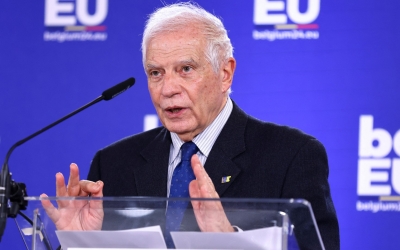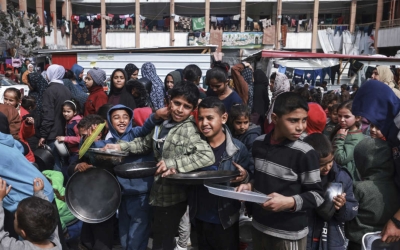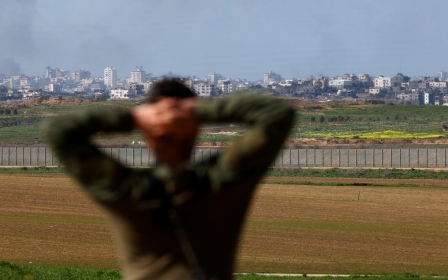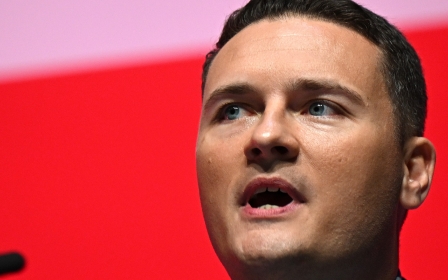War on Gaza: Is Europe finally turning up the heat on Israel?
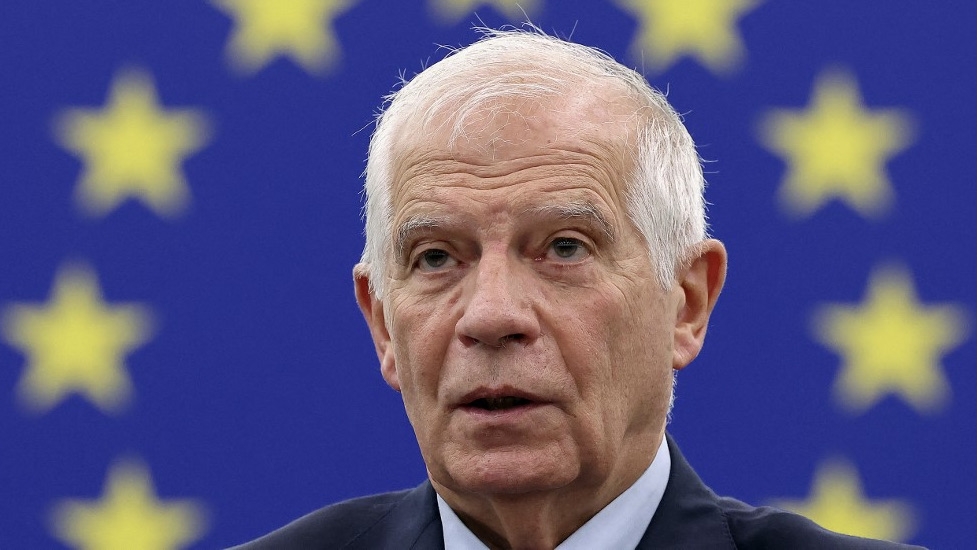
In a couple of weeks, the Gaza crisis will enter its fifth month. At this stage of Israel's brutal bombardment of the Gaza Strip, it is worthwhile asking whether the European Union and other important players are undergoing a shift in terms of their position on the conflict.
The first clue that something might be changing came from a largely unreported confidential non-paper, which is an informal document put forward in closed negotiations within EU institutions, that the European Union External Actions Service (EEAS) circulated to the member states in January. The document seeks to outline practical steps to re-initiate the Middle East peace process.
The document was purely political. It aimed to address not the attack of 7 October and what followed - Israel unleashing of a genocidal war on Gaza - but rather the root causes of the conflict and Israel's occupation of Palestinian lands since 1967.
It finally acknowledged the tragic reality of the daily Israeli violence against the Palestinian people both in Gaza, the occupied West Bank and East Jerusalem, which has been going on for decades before 7 October 2023. And for the past four months during Israel's onslaught on Gaza, this violence, especially in the West Bank and east Jerusalem, has largely gone unreported.
The fact that a document like that could be produced within a commission ruled by Ursula von der Leyen was itself a miracle.
New MEE newsletter: Jerusalem Dispatch
Sign up to get the latest insights and analysis on Israel-Palestine, alongside Turkey Unpacked and other MEE newsletters
During the past four months and, as Israel's war on Gaza enters its fifth month, the president of the European Commission has sounded like a stuck record, repeating the mantra that Israel had the right to defend itself.
At the same time, she was unable to utter a single word of empathy for the killing of thousands of Palestinian civilians, mainly women and children. Sometimes she offered insincere lip service by asking for a proportionate retaliation, but she was never able to utter the word "ceasefire".
The least that can be said is that she was in good company, flanked by top EU powers Germany, France and Italy - not to mention the US and the UK.
A peace plan
The most interesting part of the non-paper was paragraph 11, which said: “Once completed, the peace plan should be presented to the conflicting parties. It will be for them to negotiate the final text. In order to favour those negotiations, the contributing states and international organisations should at that point set out the consequences [my italics] they envisage to attach to engagement or non-engagement with the peace plan.”
This paragraph said a few important things.
Follow Middle East Eye's live coverage of the Israel-Palestine war
Firstly, that this peace plan should be overseen by a group of states and international organisations and should not be left in the hands of the US alone.
This makes sense simply because a peace process that is run only by the US is not a guarantee for a fair process since the US, in the eyes of the majority of Arabs, is not an honest broker. It never was. A process run by a contact group or other nations and international organisations can offer better guarantees.
It would be a radical departure from the usual practice of the last few decades, whereby the peace process was run by the US and exclusively formed by Israel elaborating ideas and delivering them to Washington. The US would then draft them into a peace proposal and present it to the Palestinians as a US plan, swearing that it had not been previously agreed with Israel.
Whenever the Palestinians - who are perfectly aware of the US-Israeli game - objected, US administrations would usually blame them for missing the opportunity provided.
The EEAS non-paper essentially recreated a contact group like the quartet (the US, UN, EU and Russia), which in the early 2000s drafted the so-called road map, which unfortunately went nowhere.
Bear in mind that the Israeli government imposed 15 objections on the road map, with the clear intention of emptying it of any meaning without incurring any consequences from Washington and the other quartet members.
However, the most important element of paragraph 11 is where it made explicit the possibility of consequences to one or both parties if they did not engage with the peace plan. It implied for the first time that the EEAS was ready to consider consequences - punishment? sanctions? - against Israel if it rejected or did not engage with the proposals.
The EU has had no problems in the past sanctioning the Palestinians, but it has never contemplated such an option for Israel. Are we watching the beginning of the end of the decades-old impunity that Israel has enjoyed?
Israel losing narrative battle
Furthermore, in the last few weeks, the EU's high representative, Josep Borrell, has also taken the brave initiative of denouncing previous statements by Israeli Prime Minister Benjamin Netanyahu, which had claimed the importance of funding Hamas to further split the Palestinian national movement and undermine the Palestinian National Authority as a negotiating partner.
More recently, he has asked the United States to provide "less arms" to Israel.
The second clue that something was perhaps shifting came on 30 January, when Britain's Foreign Secretary David Cameron said that the UK was considering the formal recognition of a Palestinian state.
He qualified this option as a demonstration of “irreversible progress” towards a two-state solution. Such clarification implied that London could be ready to recognise a Palestinian state before the two-state solution was accomplished.
In other words, it would be a slap in the face for Israel and a tangible sign of commitment towards Palestinian aspirations.
It is not known if Cameron’s statement was previously agreed with the White House, but it would be good to think it was.
Finally, last Monday, 26 of the EU's 27 member states - Hungary refused to join - asked for a humanitarian truce in Gaza and for Israel not to press ahead with its planned military assault on Rafah, on the Gaza-Egypt border. Hungary also blocked EU sanctions against violent Israeli settlers.
So, it would appear that something is changing. That it took the deaths of 30,000 Palestinian civilians for Europe to reconsider its position is shameful, but let’s hope that the EU is now on the right course.
Meanwhile, the US is drafting its own UN Security Council resolution on Gaza. In the text, the word ceasefire is used for the first time in US diplomacy - although with important caveats - and states that an offensive on Rafah should not proceed.
Nevertheless, in order not to leave a single stone unturned in its poisoned shielding of Israel at the UN, the US on Tuesday cast its third veto to block an Algerian-led Security Council resolution asking for a ceasefire. The US has uttered many beautiful words lately, but what counts is its acts, and they speak for themselves.
Taken singularly, these moves might not add up to much. But taken together, they provide a clear sense that the mood is changing and that Israel is - at least - beginning to lose the narrative battle.
The views expressed in this article belong to the author and do not necessarily reflect the editorial policy of Middle East Eye.
Middle East Eye delivers independent and unrivalled coverage and analysis of the Middle East, North Africa and beyond. To learn more about republishing this content and the associated fees, please fill out this form. More about MEE can be found here.



